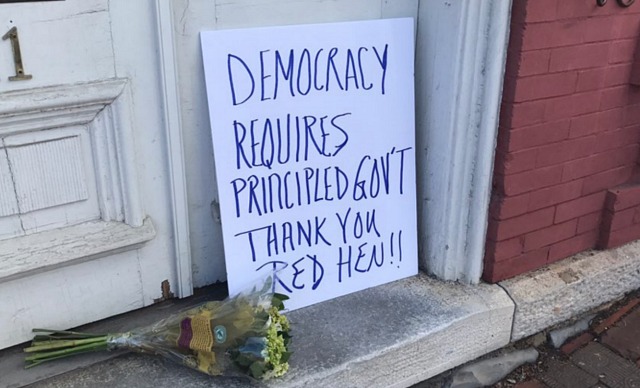Daily
Trump Lynch
While researching a 1995 Los Angeles magazine piece called “Right Face,” the late L.M. Kit Carson told me that he sensed a while back that David Lynch was an offbeat conservative. “He’s kind of like Jimmy Stewart on the surface, all golly-gee-gosh,” Carson said, “but dark and creepy underneath.”
I thought of Carson’s observation last weekend when I read Lynch’s oddball, left-handed praising of Donald Trump. I’m not sure Lynch was actually calling Trump a great president as much as a bull in a china shop.
Tuesday, 4:40 pm Pacific: A few hours ago Lynch posted a message to Trump on Facebook.
“Both the Breitbart article and Trump’s retweet show how hungry the Republican right is for acceptance by Hollywood. They are so famished for celebrity praise that they’ll even take it in the form of [a] very ironic and slippery statement from a film director who loves to cultivate an air of mystery.” — posted yesterday by New Republic‘s Jeet Heer.
Pollack Years
Sydney Pollack passed just over a decade ago. He came to mind a few hours ago when an HE commenter dismissed Pollack’s The Interpreter (’05) as “lame’ and “out of touch.” I reminded that The Interpreter has a bomb-in-a bus sequence that’s fairly brilliant. Otherwise it’s an above-average, reasonably engaging drama of its type. (Consider this Desson Thomson review.) Not a perfect film, but an above-average, reasonably decent one.
Pollack made a lot of films that fell under this category, but I’ve know very few filmmakers who worked harder at getting it right. Each and every time he really sweated bullets.
From my Pollack obit: “If you had told me 18 months ago that Pollack and Anthony Minghella, partners in Mirage Enterprises who worked together on The English Patient, Cold Mountain, The Quiet American and several other quality films…if you had told me then that both of these guys would be lights-out by May 2008, I would’ve said “what…?” Both of them were too active and alive. They had too much talent and know-how, too many miles to go.
People always bring up Out of Africa (’85) and Tootsie (’82), the hugely successful comedy with Dustin Hoffman as a straight cross-dressing actor, as Pollack’s finest, best-known films. They’re both solid and accomplished (Tootsie especially), but the Pollack pics that I’ve most enjoyed are the genre thrillers — Three Days of the Condor, particularly, and The Firm — because they exceed their boundaries and then some. They’re about Pollack adding shrewd and surprising things rather than just meeting expectations.
Both have melancholy emotional currents — feelings of loss and regret — and some graceful resignations, courtesy of the wry and understated dialogue by David Rayfiel, Pollack’s pinch-hit rewrite guy for decades. Plus they’re both driven by character as much as plot.
Gene Hackman‘s confession to Jeanne Tripplehorn in The Firm that he plays around “because my wife understands me.” (Too well, he meant.) European Condor assassin Max Von Sydow working with miniature models in his New York hotel room. Condor CIA guy Cliff Robertson asking his superior, played by John Houseman, if he misses the “action” he encountered during the World War II years, and Houseman responding, “No, I miss that kind of clarity.” Both films teem with this kind of stuff.
After these my favorites are (a) Sketches of Frank Gehry (Pollack’s wise, affectionate, layman-level appreciation of our greatest architect), (b) Jeremiah Johnson, (c) the final voice-over moment in Havana, (d) the first half of Random Hearts, (e) all of The Yakuza, They Shoot Horses, Don’t They? and Castle Keep, (f) the bomb-on-the-bus scene in The Interpreter and (g) portions of The Way We Were, particularly the final scene.
And, of course, there were Sydney’s first-rate performances — the divorcee in Husbands and Wives, that red-felt pool table scene with Tom Cruise in Eyes Wide Shut, a pair of cynical and corroded seen-it-alls in Changing Lanes and Michael Clayton.
Changed Landscape
A friend just sent me a love-story script that he describes as “Brokeback Mountain meets Jarhead.” Gay love stories have only had a foothold since the beginning of the century, or maybe a little later. They were a relative rarity when Brokeback came out 13 years ago. Nowadays they’re all we’re seeing, it seems, in a romantic context. Certainly in my realm.
Not that many haven’t been good or generally made the movie universe a more intriguing or open-hearted place, but we’re basically living through an era in which the romantic and sexual lives of 96% of the population — am I allowed to say this? — are being elbowed aside. Partly because the 4% side of things feels fresher, more interesting, different and more politically correct, and partly because screenwriters these days seem to believe that the straight side of the aisle is fairly boring. Right now, in terms of green-lightable love stories, the 4% equation is pretty much everything. And yet the 96% must be experiencing some intense or certainly unusual times these days, no? Some of them good enough to turn into a film?
You know what would be really shocking right now? A movie like The Way We Were. I know how sappy that sounds, but never forget that Sydney Pollack‘s film has, at the very least, a great ending. A film like that could never happen now, of course, in part because we’re living in a realm in which 96% of the population is being commonly referred to by the politically attuned (and for the first time in the history of civilization, and somewhat derogatorily) as cisgender. 2018 to the ghost of James Stewart: “Did you know that during your time on earth you were a cisgender person?” Stewart to 2018: “I didn’t know that.”
I’m probably going to get killed for saying this.
Half-Year Toppers
Awards Daily‘s half-year poll, announced earlier today, has Paul Schrader’s First Reformed at the top of the list, followed closely by Ari Aster’s Hereditary.
114 film critics, journalists, bloggers and entertainment reporters participated in the poll, which was compiled by Jordan Ruimy. Responders included Stephen Witty, Katie Walsh, Peter Travers, Claudia Puig, Ray Pride, Steve Pond, Amy Nicholson, Joana Langfield, Tomris Laffly, Pete Howell, David Edelstein, David Ansen, Matt Zoller Seitz and yours truly. More than 70 movies (mostly English-language) were mentioned. Six of the top 30 were foreign-language films.
1. First Reformed (Paul Schrader, U.S.) (71 lists)
2. Hereditary (Ari Aster, U.S.) (65)
3. You Were Never Really Here (Lynne Ramsay, U.S.) (64)
4. Annihilation (Alex Garland, U.S.) (61)
5. Black Panther (Ryan Coogler, U.S.)( 61)
6. The Rider (Chloe Zhao, U.S.) (54)
7. A Quiet Place (John Krasinski, U.S.)(49)
8. Paddington (Paul King, U.K.) (49)
9. Isle of Dogs (Wes Anderson, U.S.) (40)
10. Won’t You Be My Neighbor (Morgan Neville, U.S.) (34)
HE’s Ten Best So Far (revised today): Paul Schrader‘s First Reformed, Ari Aster‘s Hereditary, John Krasinski‘s A Quiet Place, Stefano Sollima‘s Sicario: Day of the Soldado, Eugene Jarecki‘s The King, Lynne Ramsay‘s You Were Never Really Here, Tony Zierra‘s Filmworker, Andrej Zvyagintsev‘s Loveless, Tony Gilroy‘s Beirut, Wes Anderson‘s Isle of Dogs.
Sanders/RedHen Perspective
Posted on Facebook earlier today: “Back in the mid-1990s, we rode up to a bistro in Paris on our bikes. At the same time a posh, snooty couple parked their SUV on the sidewalk and walked over to the proprietor, who was outside having a smoke, to see if he had a table. He looked them up and down, looked at the whale of a vehicle taking up the sidewalk, and said ‘Nope.’ I was sad — it looked so charming and I was hoping we could have dinner there. My French husband said, ‘I’m not so sure we can’t.’ We locked up our bikes — this was ten years before bikes were everywhere in Paris — and walked over, and my husband asked. The proprietor looked us up and down, looked at our bikes, smiled and said, ‘Yes, of course.’ We dined there regularly for the next 15 years, until the owner retired and sold the place. That’s what prerogative is all about.” #teamredhen


EW’s Prospective Oscar Noms
Last week Entertainment Weekly‘s Joey Nolfi and Piya Sinha-Rpy suggested 15 Oscar contenders thus far (“Oscars 2019: From Black Panther to Hereditary“). Here they are alongside HE reactions:
1. Spike Lee‘s Black Klansman for Best Picture. HE response: A partly illogical but reasonably decent procedural about an actual undercover FBI operation again the Ku Klux Klan that happened in the ’70s. Great anti-Trump finale but it’s just not stellar enough to rank as a Best Picture contender. Not happening.
2. Ethan Hawke for Best Actor in First Reformed. HE response: Yes! Great performance, superb film, great Schrader comeback. If there’s a God, it’ll happen.
3. Glenn Close for Best Actress in The Wife. HE response: Definitely. Close’s performance stands tall on its own, but the role (gidted writer married to best-selling author) and the film synch perfectly with the #MeToo zeitgeist, and Close is totally owed after six Best Actress noms. She’s not only a Best Actress lock, but she really might win. Hell, she probably will.
4. Ryan Coogler‘s Black Panther for Best Picture. HE response: It’ll be nominated, yes, but don’t forget that only the last hour of Black Panther is really good — the rest is just okay. It’ll get the nomination because of (a) the huge grosses ($699,747,193 domestic, $1,346,344,642 worldwide) and (b) the fact that representational identity politics matter to the New Academy Kidz.
5. Toni Collette for Best Actress in Hereditary. HE response: Agreed, she’s great in this, but when was the last time that the Academy nominated a performance in a horror film? This said, HE totally supports Collette and Hereditary.
6. Daveed Diggs for Best Actor in Blindspotting. HE response: Not a chance.
7. Brad Bird‘s Incredibles 2 for Best Animated Features. HE response: Probably, but it’s not as good as the original and the Academy knows this.
8. Natalie Portman for Best Actress in Annihilation. HE response: Forget it.
9. Wes Anderson‘s Isle of Dogs for Best Animated Feature. HE response: SURE!! What does Justin Chang know?
10. RBG for Best Documentary Feature. HE response: Definitely!!
Soulful, Duct-Taped, Guitar-Pickin’ Galumph
Country singer and songwriter Blaze Foley was much admired within his realm, but he was also a big ornery sucker who drank too much. When his significant other Sybil Rosen introduced Blaze to her parents, her mother took one look and reportedly wept. I myself wept when I read about Foley’s habit of wearing duct tape wrapped around his boots (total low-rent asshole move), and how he once made a suit out of duct tape (worse), and how his casket was wrapped in the stuff. (Foley was shot to death at age 39 in 1989.)
From “Song Of a Poet Who Died in the Gutter“: “It almost goes without saying that films about musicians will focus on boozy, self-destructive behavior — Walk The Line, Bird, I Saw The Light, Payday, Michael Apted‘s Stardust, etc. But Blaze feels home-grown and self-owned in a subdued sort of way. It has a downmarket, lived-in vibe. I wasn’t exactly ‘entertained’, but every line, scene and performance felt honest and unforced.
Gifted but temperamental, Foley (Ben Dickey) never really got rolling as a recording artist, but he was a well-respected outlaw artist with a certain following in the ’70s and ’80s. Dickey’s purry singing style, similar to Foley’s, reminds me of a sadder Tony Joe White (“Polk Salad Annie”).
Hawke focuses on the guy’s soft, meditative side and particularly his relationship with real-life ex Sybil Rosen (Alia Shawkat). He gets a truly exceptional performance out of Dickey, a hulking, elephant-sized musician who’s never acted prior to this. Dickey’s Foley is such a good fit — centered, settled, unhurried — that I nearly forgot about the bulk factor.
Blaze offers noteworthy supporting perfs from Kris Kristofferson (as Foley’s dad), Sam Rockwell, Richard Linklater, Steve Zahn (as a trio of record company partners) and Josh Hamilton, among others.
The script was co-written by Hawke and Rosen, author of a relationship memoir titled titled “Living in the Woods in a Tree: Remembering Blaze Foley“. You can just sense that Hawke knows musician behavior like his own. Hell, I was one myself (i.e., a mediocre drummer) for a while, and know the turf to some extent, and it all feels right.
In-Depth Academy Questionaires
The Motion Picture Academy has invited 928 new people to join. Women will henceforth represent 31% of the membership, up 28% from last year. POCs will now comprise 16% of the membership, up from last year’s 13% tally.
If I were a senior member of the governor’s board, I would push for in-depth questionaires before final admittance. I would ask the following of all prospective new members: “Do you primarily regard motion picture theatres as (a) churches, (b) amusement arenas or (c) watching-and-texting salons?” If the prospective member answers “churches,” he/she would be admitted. If not, forget it.

Specific Tiffany Haddish question: “You’ve said you often decide which movies you want to see from what the women at your beauty salon tell you. Do you occasionally decide on your own? Do you ever read reviews or at least Rotten Tomatoes or Metacritic?” If Haddish were to answer “Rotten who?…Meta what?…my beauty salon girls know best!,” I would say “approve her membership!”
I would also ask Haddish the following: “If you’re again asked to announce the Academy Award nominees, would you consider trying to learn how to pronounce their names correctly before going on the air?”
Timothee Chalamet: “Last January you threw Woody Allen under the bus in order to enhance your standing with the #MeToo community, but have you since read Moses Farrow’s essay? If so, any second thoughts?”
Mindy Kaling: “Do you still feel that the views of old-white-guy critics should be regarded askance if they aren’t part of a focus-group demographic that a certain film has been made for? Should only critics who relate to target demos review this or that film?”
99 In The Shade
Not quite a full day in Palm Springs. Arrived last evening, up early this morning, hiking in Palm and Andreas canyons, cable-car to the peak of Mount San Jacinto (which I hate visiting because of the tourists) and then back to Los Angeles by 7:30 pm — 22 1/2 hours total.


As Tom Hagen Would Say…
It was suggested yesterday that in the absence of Movie City News, an industry-news-link aggregation feature could be a major selling point for HE-plus. Hollywood Elsewhere is hereby looking for a sharp journalism graduate to perform this task on a valued-intern basis. You can honestly claim on your resume that you served (are currently serving) as news editor for a prominent, industry-followed site that everyone reads, and you can get yourself into occasional L.A. and N.Y. screenings in exchange. A nice deal.

